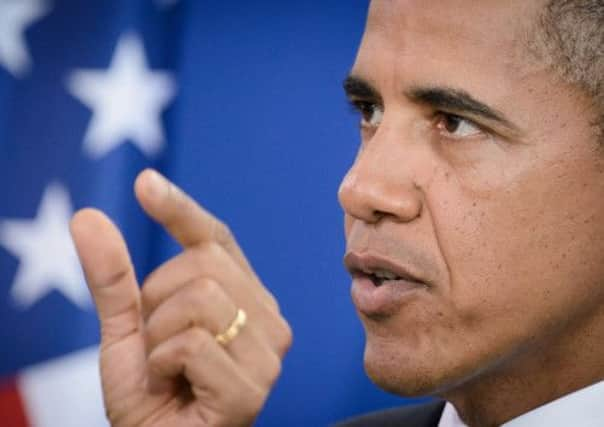George Kerevan: Analysing negotiations with the Taleban


Rumours are rife that the US administration and the Taleban will begin some sort of peace negotiations any day.
The British media reported these developments with the emphasis on a decision by an irritated president Karzai to “suspend” talks with the White House over a post-2014 Bilateral Security treaty, allowing America to keep bases in Afghanistan. Understandably, the Afghan president has always opposed attempts by the Americans to treat with the Taleban leadership independently. At least without getting a pro forma commitment from the insurgents to some kind of cessation of violence.
Advertisement
Hide AdAdvertisement
Hide AdBut President Obama has ignored these modest precepts. For the White House is desperate to find a political fig leaf to cover America’s exit from Afghanistan. So the Taleban were handed a propaganda victory by being allowed to open their embassy in Qatar, which is in effect the biggest US military base in the region, signalling de facto recognition by the White House.
Of course there is nothing wrong with encouraging a peace process in Afghanistan, or in recognising that a genuine settlement means reconciliation with those elements of the Taleban who see themselves as fighting a war against foreign occupation. But that is not what happened this week. Rather, we are witnessing the West quitting Afghanistan in a hurry even if it means undermining Mr Karzai in the process.
In fact, the war on the ground in Afghanistan is intensifying just as Nato packs its bags to leave next year. The Taleban have just announced a “monumental” (their words) offensive. The number of Afghan civilians killed or wounded in the first six months of this year is 24 per cent higher than for the same period in 2012. Taleban units are operating in larger formations, especially in rural areas. And there is an influx of foreign fighters, particularly madrassa students from Pakistan.
The Taleban are exploiting Western war weariness ruthlessly and efficiently. This month they have concentrated attacks on Georgian troops in Helmand province, killing ten of them. The Georgian government instantly announced it was closing three of its Afghan bases – previously held by US marines before America began its own pullout.
The Taleban are seizing ground in order to maximise their political influence in any negotiations. Meanwhile, the clock is ticking for Hamid Karzai who is supposed to demit office in 2015. But Mr Karzai, who is a Pashtun tribal leader, might scrap the next presidential election and rule by decree. That gamble could spark civil war with the northern tribes who have just agreed to unite behind a single candidate for the elections, in order to curb Pashtun influence.
Fortunately for Mr Karzai, the insurgents are also divided. Besides the Taleban proper, and foreign al-Qaeda elements, there is Hezb-e Islami, usually known as HIG. Led by the charismatic Gulbuddin Hekmatyar, who helped lead the fight against Soviet occupation, HIG has a legal political wing with MPs in the Afghan parliament. It is with HIG that Mr Karzai and the Americans originally tried to do a deal.
But these peace talks foundered last month when HIG rejected any notion of the Americans keeping bases in Afghanistan to pursue their drone attacks on Pakistan. In the last few weeks HIG has launched terror attacks inside Kabul. Mr Karzai’s only real hope with HIG is to dump the Americans – which may explain this week’s show of public outrage against the White House.
Ultimately, the fate of Afghanistan will be decided in Pakistan. It is the Pakistani military that supply the Taleban and give it sanctuary. Why? There is a long-standing enmity between Afghanistan and Pakistan. In the 19th century, the Brits carved off part of independent Afghanistan and added it to British India, splitting the majority Pashtun tribe. When Pakistan got independence in 1947, it refused to hand back the Pashtun areas to Afghanistan, provoking a still-unresolved border conflict.
Advertisement
Hide AdAdvertisement
Hide AdThe Pakistani military use the Taleban as a weapon in their border dispute with Afghanistan and as a means of containing Indian influence in Kabul. In fact, Pakistani control over the Taleban has increased markedly in recent years. Paradoxically, as the Americans succeeded in killing more and more of the traditional mid-level Taleban commanders using drones and Special Forces, these cadres have been replaced by Pakistani-trained militants. The latter are better educated and more than a match for the corrupt elite in Kabul.
No wonder the election victory by prime minister Nawaz Sharif has caused alarm in Kabul: it was Mr Sharif who recognised the Taleban government in Kabul in 1997. The Americans, naïvely, are praising president Mr Sharif for pushing the Taleban to the negotiating table. But Mr Sharif will be the winner in any negotiations that get US drone bases out of Afghanistan.
Mr Obama wants the release of Private Bowe Bergdahl, a US soldier captured bin 2009. In return the Taleban are seeking the release of key militants from Guantanamo. A deal would give Mr Obama headlines at home but strengthen the hand of the Taleban and Pakistan in the region. As far as the White House is concerned, president Karzai is now expendable. Mr Obama might even be counting on the Pakistanis to police Afghanistan for them.
For over a decade the West has been fighting a senseless war in Afghanistan while al-Qaeda – the ostensible reason for our intervention - has been in Pakistan. This absurd war has cost British and Afghan lives while creating an excuse (“foreign intervention”) that has justified the growing Taleban insurgency. Now our politicians are lying to us about a non-existent reconciliation process in order to cover their ignominious retreat.